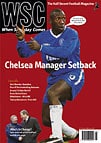 When two rivals come together to build a new stadium, the potential for disaster is huge – as Bayern Munich and Munich 1860 are finding out, as Mathias Kowoll reports
When two rivals come together to build a new stadium, the potential for disaster is huge – as Bayern Munich and Munich 1860 are finding out, as Mathias Kowoll reports
On March 9, 2004, more than 50 men in suits and uniforms entered TSV 1860 Munich’s headquarters. “I first thought they were from a fan club and wanted some autographs,” said the receptionist. The fan club turned out to be a delegation from the prosecutor and the police, who had come to confiscate files and arrest club president Karl-Heinz Wildmoser and his son.
Construction company Alpine had paid €2.8 million (£1.85m) to win the contract to build Munich’s new stadium, but the prosecutor’s office just didn’t accept that the payment was “totally normal”. It was alleged Wildmoser and his son, Heinzi, had given details of other bids to Alpine in exchange for cash. Still, the celebrations of a few dozen fans gathered outside 1860’s traditional ground on the night of the arrests might have been a tad premature.
Wildmoser did step down as president a few days later, thus fulfilling the long-standing fan demand of “Wildmoser Out”. But after three days, the man who had led 1860 from the third division to the Bundesliga, but also away from their roots on a Bayern Munich-Lite course, paid €200,000 in bail, was released and made the supervisory board name an old friend as his successor. The press has started to list the negative elements of Wildmoser’s reign that it had ignored for so long. But the dream of returning to the Grünwalder Strasse ground – abandoned a decade ago to groundshare with Bayern – and getting some of the lost fans and pride back seems, for the time being, to remain just that – a dream.
The history of a mediocre Bundesliga club doesn’t explain why the story led the evening news, or why even CNN found time for it. For Germans themselves, it’s another blow to their squeaky-clean self-image. It shows that the system of financial accountability the German FA is so proud of is far from perfect. It’s not just in Italy or Brazil that one man can run a professional football club like his own property: Munich 1860 might just be the tip of an iceberg. What’s more, the new stadium may not be ready in time for the 2006 World Cup.
Bayern first decided to take the moral high road. “We are very concerned about our reputation,” Karl-Heinz Rummenigge declared. All 1860 personnel left executive positions in the joint venture stadium company. But Bayern began legal proceedings against Wildmoser, a step that might halt work at the site and jeopardise the tight schedule. It has since emerged that the wife of the Bayern-appointed CEO owns a furniture company that won a fat contract for supplying the armchairs in the celebrity section of the stadium. Her husband stepped down two weeks before the Wildmoser scandal broke – for private reasons, of course. Now it might be the banks involved that will take a closer look at what is happening to their money over there in the north Munich swamps.
One consequence of the story is already clear. The World Cup will not be the unblemished, carefree celebration the PR people want it to be. First, the opinion swings of some voters a few hours before FIFA gave Germany the nod over South Africa gave rise to more than vague rumours of unaccounted money transfers; now this. The claims of the organising committee that “we want to learn from mistakes made in the past” already rings slightly hollow.
From WSC 207 May 2004. What was happening this month